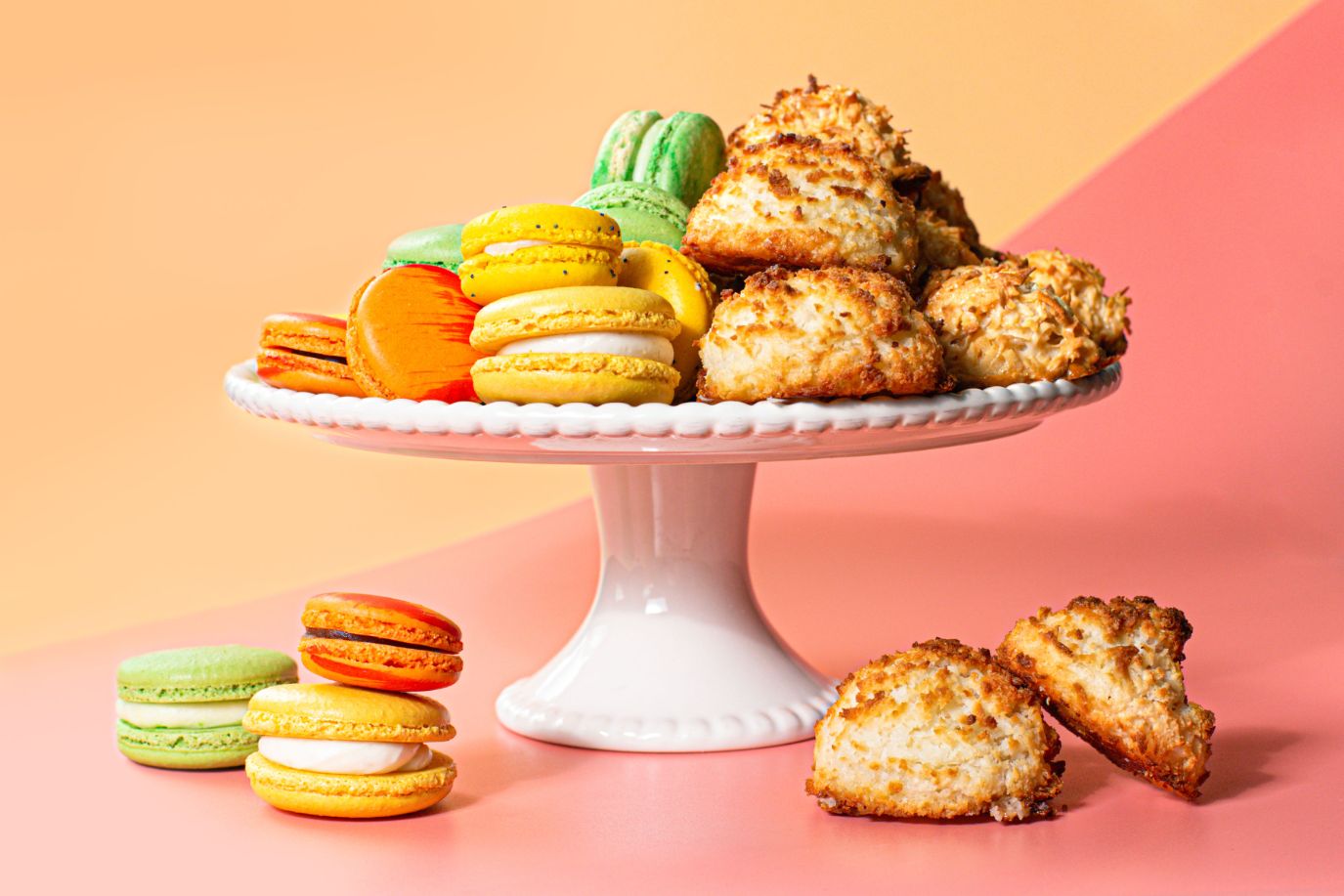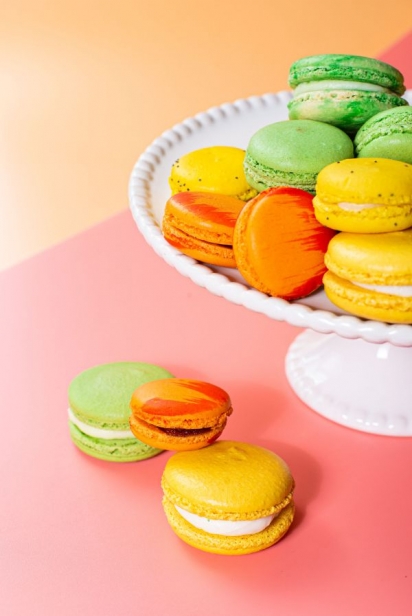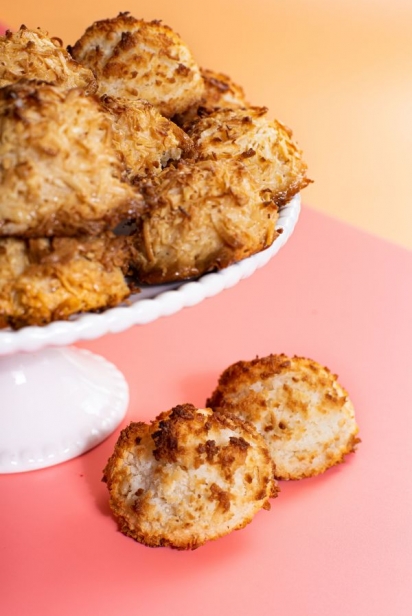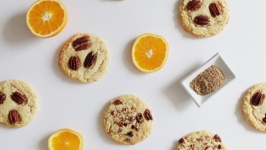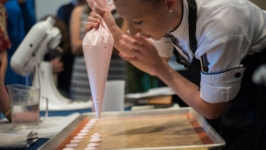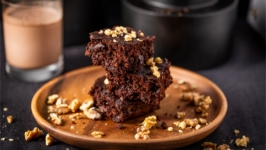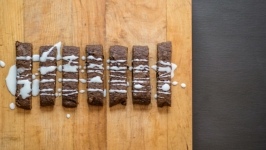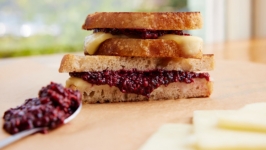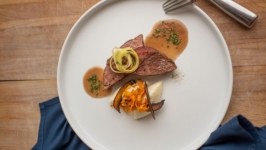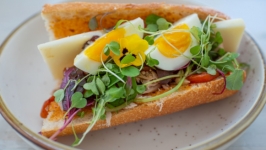What's the Difference Between Macarons and Macaroons?
Time for a culinary vocabulary quiz: Is there a difference between macarons and macaroons? If you answered, “there is none, they are the same thing,” allow me to help broaden your culinary horizons. There seems to be quite a bit of confusion (even the all-knowing Google refers to macarons when searching for a macaroon recipe). I’m here to help you sort out, and properly pronounce, these two similar yet very different cookies.
Let’s start with the popular kid on the street right now – the macaron. Pronounced mack-uh-ROHN, this consists of two meringue-based cookies sandwiched together with buttercream, ganache, jam or other fillings. Macarons come in a variety of flavors and colors, and, since their arrival in the U.S. from France about a decade ago, have quickly gained an enthusiastic following.
Now for the cookie with an extra “O.” The word macaroon, or mack-ah-ROON as we like to say in my house, may have come from the French word macaron, but beyond that they have little in common. Granted, each cookie includes whipped egg whites but macaroons look and taste nothing like the little French cookie. Here’s a handy trick to differentiate between the two: when you want a macaroon, think coconut with two “O”s, the key ingredient that separates the ‘roon from the ‘ron.
Macarons are finicky to bake, as any home cook who has tried them can tell you. First, whip egg whites into a meringue-like consistency, then carefully fold in finely ground almond meal, sugar, flavoring and color. Pipe the batter onto a baking sheet and bake. Sounds easy enough, but it takes a good bit of practice to avoid the sunken macaron – the cookies are supposed to be light and airy with a gentle crunch.
Macaroons on the other hand require little finesse. Combine stiffly beaten egg whites with shredded coconut, sugar and vanilla, drop onto a baking sheet with a spoon in the shape of small mounds or pyramids and bake until golden brown. Where macarons are delicate with a smooth surface, macaroons are chewy, sticky and dense with a craggy exterior.
How can these two cookies be confusing? Am I the only one who is frustrated by this abuse of nomenclature? To calm my inner Francophile, I reached out to Pastry Chef Rebecca Reed of the Black Sheep Restaurant Group to see how she handles this name game. I met Reed seven years ago at a class she was teaching on how to make macarons, so I figured she would be a good subject matter expert.
“I feel the same frustration with people using the incorrect terminology for macarons and macaroons,” says Reed. “I hear it all the time. It is the most prevalent error in diction for all the French pastries I create! They come from the same root word, so they are spelled and pronounced in a similar way, but that one little 'o' does make all the difference! Most of the time, I find it hard to correct people when they use the wrong word.”
Perhaps if the macaron wasn’t so popular the macaroon wouldn’t be suffering from an identity crisis. As Reed points out, there’s not much to dislike about these dainty cookies. “Visually, they're stunning. They also easily fit into the recent trend of gluten-free diets. There's just a lot to enjoy in the flavor department with these two-bite little cookies. It makes them hard to resist and easy to crave going back for another helping. Macarons come in all sorts of vibrant eye-catching colors that beg for you to snap a picture and share it on social media. This Instagram appeal only magnifies their popularity.” Many local bakeries and restaurants serve them, and there’s even a macaron franchise with several outlets in Northeast Florida.
On the other hand, it’s hard to find a local bakery that makes macaroons. They are more available in the spring around Passover; these cookies are a popular dessert at that time since they contain no flour or leavening, which are forbidden during the Jewish holiday.
Hopefully this helps clarify the difference in name and definition of these two delicious cookies. If so, please, please, please don’t say macaroon when you want a macaron, or vice versa. Practice at home if you need to avoid embarrassment when out in public. And don’t be afraid to correct other name-manglers. Or maybe it’s time to start calling macaroons by their French name, rochers coco, to differentiate between the two, because coconut rocks should be allowed to stand proudly on the dessert table.


